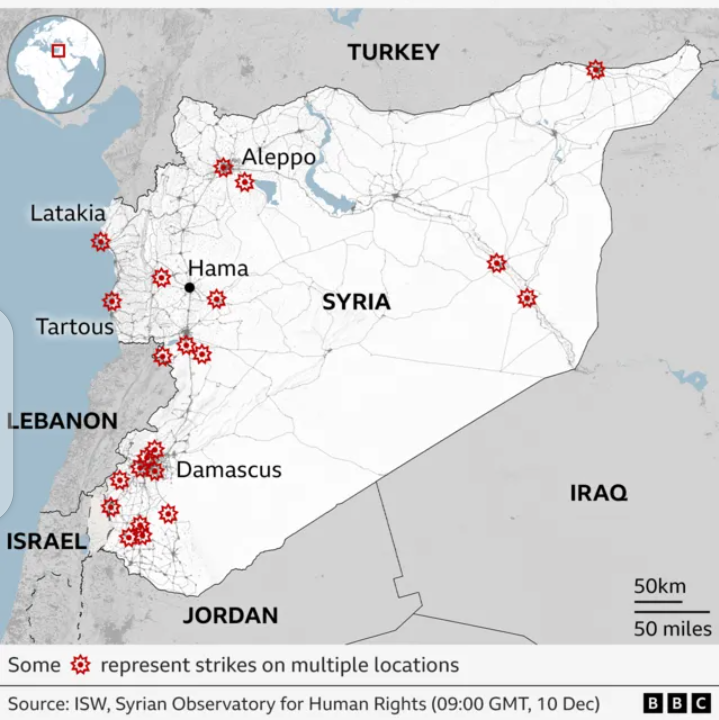Israel Confirms Strikes On Syrian Naval Fleet Amid Regional Tensions.
Israel has confirmed a series of strikes on Syria’s naval fleet and other military assets following the overthrow of Syrian President Bashar al-Assad by rebel forces. The Israeli Defence Forces (IDF) revealed that its ships targeted ports in Al-Bayda and Latakia on Monday night, destroying 15 docked vessels.
Footage verified by the BBC shows extensive damage at the Latakia port, with blasts sinking ships and damaging infrastructure. The IDF also reported conducting over 350 airstrikes on strategic locations across Syria, targeting airfields, military vehicles, anti-aircraft systems, and weapons production sites. The attacks aimed to prevent these assets from falling into the hands of extremist groups.
Israel’s Defence Minister, Israel Katz, described the operation as a “great success,” emphasising its focus on neutralising threats to Israel’s security. He stated that the strikes were part of a broader effort to “destroy strategic capabilities that threaten the State of Israel.”
In addition to the naval strikes, the IDF acknowledged deploying ground forces into the demilitarised buffer zone between Syria and the Israeli-occupied Golan Heights. While Israeli troops have reportedly entered areas beyond the buffer zone, the IDF dismissed claims of tanks approaching Damascus as “false.”

Israeli Prime Minister Benjamin Netanyahu reiterated his government’s position, stating that Israel seeks peaceful relations with the new Syrian government but will act decisively to protect its borders. Addressing the rebel group Hayat Tahrir al-Sham (HTS), which led the ousting of Assad, Netanyahu warned against allowing Iran to re-establish its presence in Syria.
Turkey condemned Israel’s actions, accusing it of adopting an “occupying mentality” during a critical period for Syria’s potential stabilisation. The buffer zone, established in 1974 as part of a ceasefire agreement, has historically been a contentious area between Israeli and Syrian forces.
The UK-based Syrian Observatory for Human Rights (SOHR) reported over 310 Israeli strikes since Sunday, significantly weakening the Syrian military. SOHR founder Rami Abdul Rahman claimed that the strikes had destroyed “all the capabilities of the Syrian army,” leaving the nation vulnerable amid political upheaval.
Israel’s focus on targeting strategic weapons, including suspected chemical weapons stockpiles, has raised international concerns. While the UN’s chemical watchdog has urged Syrian authorities to secure these stockpiles, the exact locations and quantities remain unclear.
The strikes follow the fall of Damascus to HTS forces on Sunday, marking the end of Assad’s decades-long rule. Rebel leaders have declared Syria “free” and are working to establish a new government. However, the nation’s future remains uncertain, with fears of continued instability and external interventions.
As the region navigates this period of transition, Israel’s actions underscore its commitment to safeguarding its security while cautiously monitoring developments in its volatile neighbour.



